Yemen Houthi Rebels 'Stop Israel-Bound Ship' In Latest Red Sea Attack
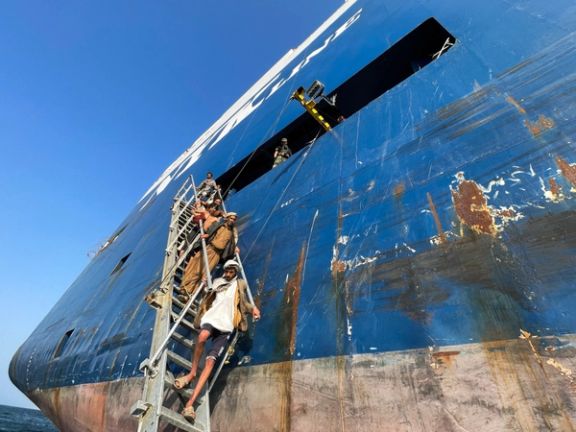
Yemen's Houthi rebels claim to have stopped a ship heading to Israel in the group’s latest response to the Gaza conflict.

Yemen's Houthi rebels claim to have stopped a ship heading to Israel in the group’s latest response to the Gaza conflict.
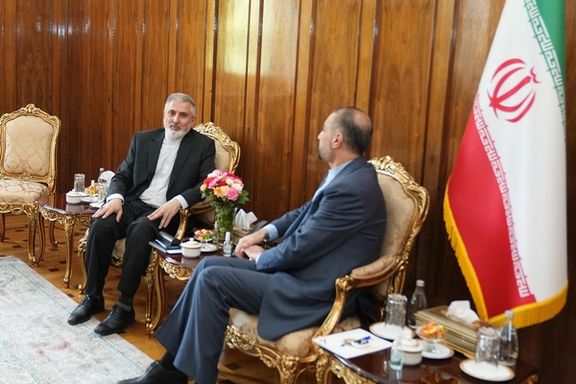
The Australian government has condemned Iran’s ambassador after he called for “an end” to Israel as the world’s “most notorious killing machine”.
Ahmad Sadeghi, who assumed the role in July, made the remarks in tweets commenting on the conflict with Hamas in Gaza.
He said: “Israeli war criminals are back to their inherent job of fear and terror. No alternative for humanity but to put an end to the heinous life of the most notorious killing machine in current world history. Hope for a world short of apartheid regime.”
In earlier remarks he equated Zionism with apartheid, saying: “It's been a faucet for occupation, ethnic cleansing & a real holocaust against [Palestinian] civilians now.”
Jewish leaders expressed shock at what they described as a brazen disregard for Australia's multicultural community, wrote the Daily Mail.
Liberal Senator Claire Chandler branded Sadeghi's statements "absolutely unacceptable" and pointed to the regime's alleged genocidal intentions towards Israel and support for terrorist groups like Hamas.
Foreign Affairs Minister Penny Wong's spokesperson said: "We condemn the Ambassador’s comments. There is no place for antisemitism in Australia. The Australian Government expects all diplomats to be respectful and constructive."
Sadeghi's official X account, which is conventionally used for diplomatic updates and photos, has featured multiple images of dead children and inflammatory invective against Israel since the conflict began in October.
He has also used it to share details of an event he attended alongside Australian National University students, where Israel was reportedly condemned as an "apartheid regime."
Pressure has mounted on the Australian government to take a tougher stance on Iran, citing reported intimidation tactics and claims of funding Hamas amid escalating tensions with Western nations.
The Iranian Embassy defended Sadeghi's remarks, asserting they align with Iran's policy for Palestinians to determine their destiny through democratic means.
The Australian National University (ANU) said that the event Sadeghi attended nwas student-led, and the university does not condone discriminatory speech.
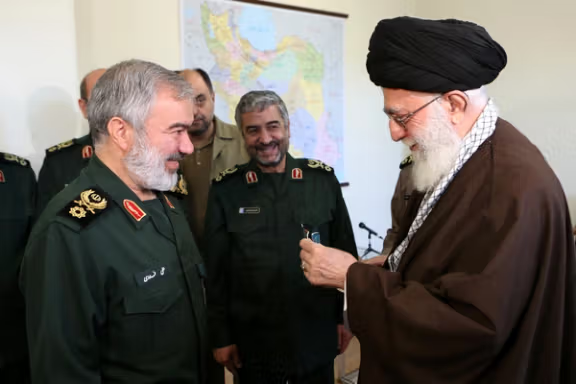
The IRGC is indifferent to who becomes Iran's next president or the outcome of parliamentary elections in March, its deputy commander Ali Fadavi has said.
During a speech at Jondi Shapur University in Ahvaz, Khuzestan Province, Fadavi emphasized that the crucial aspect for the IRGC is that the Iranian people heed Supreme Leader Ali Khamenei's directive to participate in the elections.
The implications of Fadavi's statement remain unclear. It could suggest that, like many Iranian media outlets and politicians, the Guards recognize the futility of holding elections that lack freedom, fairness, and competitiveness. Alternatively, it might indicate that the IRGC is withholding support for any specific candidate.
Fadavi's subsequent remark, "The IRGC is not going to sacrifice its reputation for any individual," implies a lack of faith in the merits of any candidate and underscores the IRGC's perceived supremacy over Iranian politicians. He asserted that while individuals may sacrifice themselves for the IRGC, the organization will not sacrifice itself for anyone.
Elsewhere in his speech, Fadavi elaborated that "We will not spend anything for anyone who would want to become the President or a member of the parliament, because the issue is not important at all."
During the past week, as the date for the parliamentary (Majles) elections gets closer, many politicians have said that Iranians do not care about the upcoming elections and that the turnout could be even lower than in the 2020 parliamentary vote and the 2021 presidential elections which were the lowest during the past 45 years.
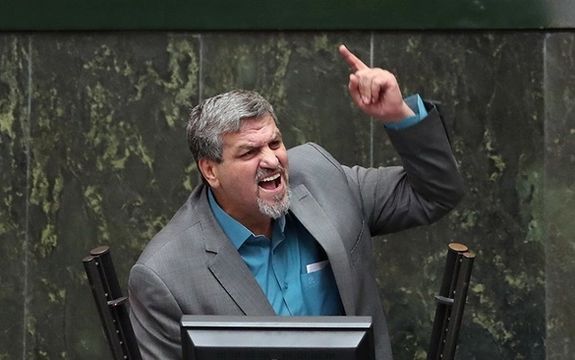
Former reformist lawmaker Mostafa Kavakebian said in his Student Day speech that most university students do not know that this is an election year. Earlier, prominent conservative politician Hamid Reza Taraghi had said the same thing about the population as a whole.
While moderate and pro-reform politicians in Iran have lost all hopes in the competitiveness of the upcoming election, only hardliners and ultraconservatives appear to take it seriously.
Even within the conservative camp, divisions are so deep and widespread that moderate and traditional conservatives such as former Majles Speaker Larijani and Expediency Council member Mohammad Reza Bahonar are not so sure that they could get through biased vetting by the Guardian Council. Of the two politicians, the former is not running, and the latter has openly said that he fears disqualification.
Meanwhile, conservative commentator Mohammad Mohajeri has said that major conservative groups are not so keen to forge strong alliances ahead of the elections as they are almost certain that the ultraconservative Paydari Party will betray them at the last moment as it has done in previous elections. As a result, every major hardline conservative group and party is likely to present its own separate list of candidates.
This would mean an even lower turnout than previous rounds and less credibility for the Majles, as those who eventually win the elections are likely to win smaller number of votes. Without a strong coalition to rally voters behind a group of candidates, few are likely to win more than a few hundred thousand votes even in big cities such as Tehran, Mashhad, and Esfahan.
Mohajeri further said that the main competition in the parliamentary elections will take place between Paydari and the supporters of current Majles Speaker Mohammad Bagher Ghalibaf. He added that regardless of reports about a coalition between Ghalibaf and Paydari, the former is making preparations for a campaign without a coalition, presumably due to Paydari's unpredictability.
Meanwhile, speaking about the possibility of former President Hassan Rouhani uniting low-key moderate and reformist candidates to win a sizeable minority in the next Majles, conservative politician Ali Yousefpour expressed doubts. He argued that Rouhani has lost his credibility among the voters due to his failure to sort out the country's economic problems during his presidency.
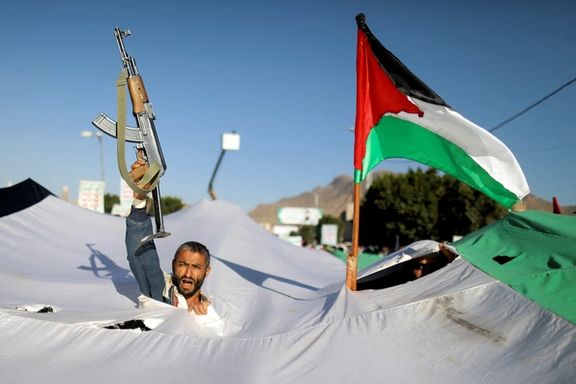
After several weeks of sporadic attacks on Red Sea shipping, Iran-backed Houthis of Yemen have threatened all ships in addition to US and Israeli vessels.
Houthis’ Information Minister Dhaif Allah (Dhaifullah) Al-Shami said Sunday that their forces will attack sensitive targets of Israel and US in the region if they move to act against the Houthis. Bragging about their attacks on vessels, he claimed that these are in response to Israel's offensive in Gaza.
Palestinian Islamist militia Hamas, another Iran-backed group, declared war on Israel on October 7 in a surprise attack that they codenamed Operation Al-Aqsa Flood, killing over 1,200, mostly civilians and taking about 250 hostages. In retaliation, Israel has been pounding the enclave to uproot Hamas, which has made the war exceedingly bloody hiding deep among the civilian population and underneath the coastal sliver’s non-military facilities.
Al-Shami's remarks came a day after General Yahya Saree, the military spokesman for Houthi rebels, warned that they would target all ships heading to Israel, regardless of their nationality. He also warned all international shipping companies against dealing with Israeli ports. "If Gaza does not receive the food and medicine it needs, all ships in the Red Sea bound for Israeli ports, regardless of their nationality, will become a target for our armed forces."
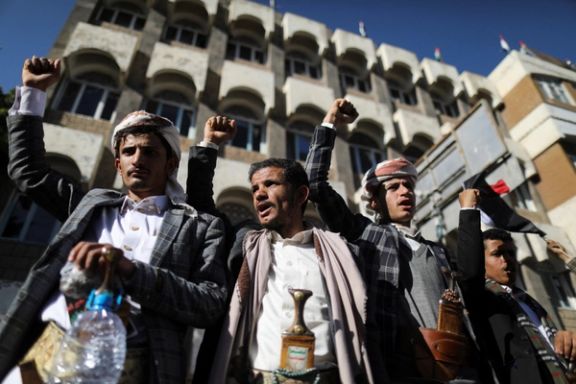
The Houthis have attacked and seized several Israeli-linked ships in the Red Sea and its Bab al-Mandab strait, a sea lane through which much of the world's oil is shipped, and fired ballistic missiles and armed drones at Israel.
According to Israeli media, Prime Minister Benjamin Netanyahu has reportedly told US President Joe Biden and German Chancellor Olaf Scholz that if they do not take military action against the Houthis soon, Israel will. The US government’s reaction to attacks on vessels in the Red Sea has been a mixture of blaming Iran and downplaying the threat to the US Navy.
The New York Times reported on Saturday that senior Israeli defense officials have intelligence that Iran is urging their regional allies, such as Hezbollah and the Houthis, to increase their attacks and pressures against Israel.
Al-Shami described the threat by the Houthis’ military spokesman as “historic,” claiming that targeting ships belonging to other countries is the next phase to put pressure on Israel after the first phase of targeting Israeli-linked ships. “This statement is a historic declaration for Yemen; a country that has been under siege and attack, facing ruthless and rebellious forces for nine years. Yet today, it rises in support and assistance to the oppressed in Gaza and throughout Palestine.”
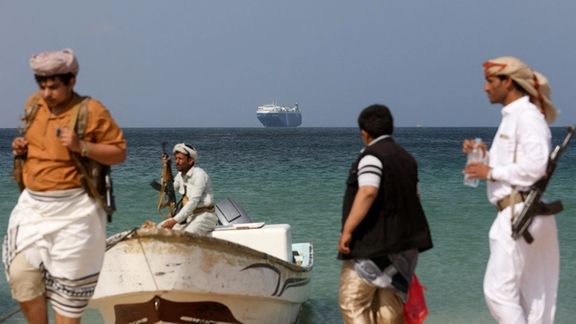
Earlier in the day, France’s defense ministry said a French warship operating in the Red Sea has shot down two drones that were launched at it from the Yemen coast. On Friday, British officials warned shipping in the Red Sea to “exercise caution.” In another one of the latest incidents, three commercial vessels came under attack in international waters last week, prompting a US Navy destroyer to intervene. The Houthis, which rule much of Yemen and its Red Sea coast, also seized last month a British-owned cargo ship that had links with an Israeli company.
The Houthis are one of several Iran-backed militant groups in the Middle East. They have been effectively in a state of war with Saudi Arabia since 2015 and have claimed support for Palestinians since the Hamas terror attack on Israel on October 7. Iran supports Hamas but says it did not play any role in the Islamist militants' terror attack that triggered the current crisis. Tehran also denies involvement in the recent attacks on vessels in the Red Sea. Iran also backs the Hezbollah, a Lebanese militant group that has deep ties with Hamas and Islamic Jihad, another Palestinian faction in Gaza that is also backed by Iran.
Iran's current war strategy is employing proxy forces to target Israel, Israeli assets, and US military installations in the region. Since the October 7 attack, Tehran has been warning of the spillover of the conflict in case of a regional escalation, but at the same time cheers attacks against Israel and the United States.
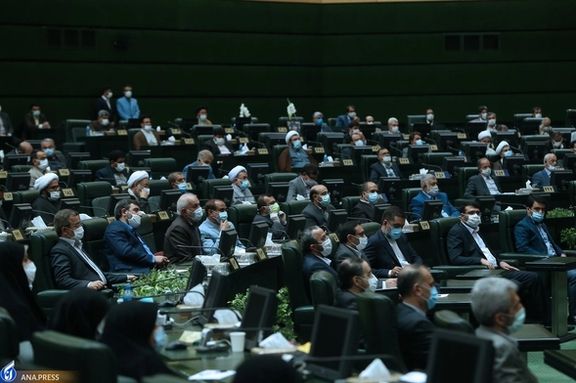
Iran's parliament has given its approval for a bill aimed at fostering cooperation with Russia in the realm of information security, as both countries are accused of extensive cyber attacks.
The bill, which implements an agreement signed three years ago by former Iranian Foreign Minister Mohammad Javad Zarif and his Russian counterpart Sergei Lavrov, received the green light from parliamentarians.
Comprising nine articles, the bill focuses on combating cyber threats, fortifying information security measures, and fostering collaboration between Iran and Russia. A notable clause in the legislation addresses the exchange of information and cooperation in prosecuting criminal offenses between the two nations.
Before the parliamentary vote, Abolfazl Amouei, spokesperson for the National Security and Foreign Policy Committee, advocated for the bill, citing the emergence of cyber threats against the two countries. He stressed that the collaboration between the Islamic Republic of Iran and the Russian Federation, as outlined in the bill, provides responsive solutions to counter these evolving threats.
However, Hosseinali Haji Deligani expressed his opposition to the bill, stating, "The terrorist objectives for the Islamic Republic of Iran and Russia differ, and the bill lacks specificity regarding the nature of collaboration. In essence, the sections are ambiguous, failing to provide guidance on how to proceed if the exchange of information contradicts our laws."
In recent years, Tehran and Moscow have strengthened their political, military, communication, and cyber ties, prompting concerns among Western countries and their allies. Microsoft's Threat Analysis Center (MTAC) recently reported that Russia, Iran, and China are likely planning to influence upcoming elections, including those in the United States in 2024. The report warned of potential targeting of "election infrastructure, campaigns, and voters" by authoritarian regimes.
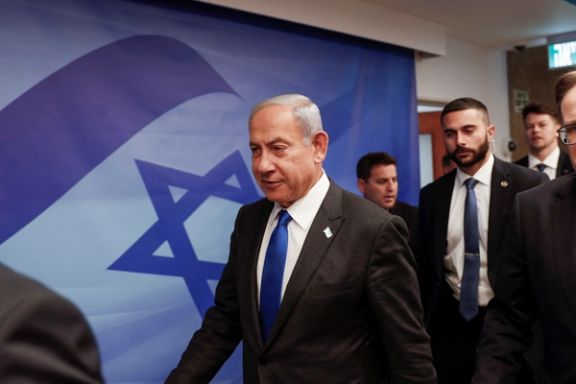
Israeli Prime Minister Benjamin Netanyahu spoke with Russian President Vladmir Putin Sunday, after Putin’s visit to the region and a trip by Iran’s president to Moscow.
Netanyahu cut short a cabinet meeting to speak with Putin on the phone an hour about Israeli hostages in Gaza and the crisis in the Middle East. He voiced “robust disapproval” of Russia’s “dangerous cooperation” with Iran, echoing concerns repeatedly voiced by the United States.
Russian and Iranian military cooperation has widened since the invasion of Ukraine. Tehran has delivered hundreds of Kamikaze drones that have been used against Ukrainian civilian and infrastructure targets. Russia is also poised to deliver advanced fighter planes to Iran and possibly receive ballistic missiles.
Criticizing Russian statements attacking Israel for its military operation in Gaza, Netanyahu told Putin that any country would have responded as Israel has to the October 7 Hamas attack and the killing of more than 1,000 Israeli civilians and the taking of hostages.
Netanyahu reportedly asked Putin to use his influence to help the 138 remaining hostages, including pressure on the Red Cross to pay humanitarian visits to the captives.
Putin traveled to the United Arab Emirates and Saudi Arabia this week and returned to Moscow to receive Iranian President Ebrahim Raisi. The two held talks for three hours on Thursday and discussed the Middle East crisis. Iran and Qatar are pushing for a ceasefire in Gaza, that Israel and the United States say would simply help Hamas to survive and lead to more crises in the future. It is not clear if Putin’s diplomatic meetings were an important part of what he discussed with Netanyahu.
In the meantime, there was a serious flare up of fighting between the Lebanese Hezbollah and Israeli forces on the border of the two countries. Hezbollah said it had launched explosive drones at an Israeli command position on Sunday and extensive Israeli air strikes hit south Lebanon.
The Israeli army said "suspicious aerial targets" had crossed from Lebanon and two were intercepted. Two Israeli soldiers were moderately wounded, and several others lightly injured from shrapnel and smoke inhalation, it said.
Israeli fighter jets carried out "an extensive series of strikes on Hezbollah terror targets in Lebanese territory", it said.
Although Hezbollah was initially expected to join the war to help Hamas by dividing Israeli forces, it has stayed out of large-scale hostilities, launching occasional and limited attacks on Israeli forces near the border. It has not fired any of its tens of thousands of missiles at Israel civilian targets.
Hezbollah’s cautious behavior follows Iran’s reluctance to directly get involved in military hostilities to help Hamas. Tehran has tried to shake off accusations that it greenlighted the Hamas attack, but its proxies have launched nearly 100 attacks against US and Israeli targets, in addition to attacks on commercial and military vessels in the Red Sea.
In a statement on X, Hussein al-Ezzi, deputy foreign minister of the Iran-backed Houthis, said that their navy forced the vessel "sailing towards occupied Palestine" to change its course and return.
The claim has not been confirmed and the account is unverified.
The Houthi rebels, supported by Iran, have escalated their activities amid the ongoing Israel-Hamas conflict.
The group has targeted Israel with missiles and drones and carried out attacks on ships in the Red Sea, including the seizure of an Israeli-owned vessel in November.
On Sunday, the Houthi information minister threatened to target all US and Israel shipping in the region.
Jon Finer, Deputy US National Security Adviser, recently said the Biden administration has not excluded military action against the Houthis as an option. However, the priority for now is establishing a maritime coalition to safeguard the Red Sea, a critical route accounting for 12% of global trade and a significant portion of energy supplies from the Middle East to Europe.
The Houthi rebels, aligned with other Iran-backed militant groups, have been effectively at war with Saudi Arabia since 2015. They have voiced support for Palestinians, especially following the Hamas terror attack on Israel on October 7. While Iran supports Hamas, it denies any involvement in the recent Red Sea vessel attacks. Tehran also supports Hezbollah, a Lebanese militant group with strong connections to both Hamas and Islamic Jihad, another Palestinian faction in Gaza also backed by Iran.
Iran's present strategy includes the use of proxy forces to target Israel, Israeli assets, and US military installations in the region.